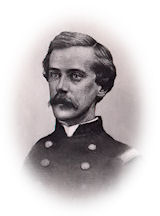April 18.—I remained with Mr. Wasson all night. A child could not have been more composed. He told me how good the Lord was in giving him such peace and strength at the last hour. About 4 o’clock A. M. he insisted that I should leave him, as I required rest. He begged so hard that I left him for a little while. When I returned he had breathed his last. One of his companions was with him, and was very attentive—told me that he died as if he was going to sleep. As Bryant has so beautifully expressed it:
“Like one who wraps the drapery of his couch
About him, and lies down to pleasant dreams.”
“O, gently close the eye
That loved to look on you;
O, seal the lip whose earliest sigh,
Whose latest breath, was true.”
Mr. Regan died this morning; was out of his mind to the last.
Since I have been here, I have been more deeply impressed than ever before with the importance of preparing while in health for that great change that must, sooner or later, happen to all. I see that it is almost impossible, while the physical system is suffering, to compose the thoughts on that all-important subject. For days before their final dissolution, many of those we see here are wandering in their minds, so that it is impossible for them to repent; and God has given us but one example of death-bed repentance, but his holy book is filled with denunciations against those who reject the gospel and quench the Holy Spirit. “Therefore will I number you to the sword, and ye shall all bow down to the slaughter: because, when I called, ye did not answer; when I spake, ye did not hear.” Isaiah xiii, 12.
It does seem strange that, amid all the terrible scenes of destruction that we are daily witnessing, we think as little of death as ever, and act as if it was something that might happen to others, but never to ourselves.
“The voice of this instructive scene
May every heart obey,
Nor be the faithful warning vain,
Which calls to watch and pray.
O, let us to that Savior fly
Whose arm alone can save;
Then shall our hopes ascend on high,
And triumph over the grave.”
Mrs. Lyons left this morning for home. She was very sick; and one of the doctors informed her, if she did not leave immediately, she would certainly die. I know the men whom she has been nursing will miss her very much, as she has been so attentive to them.
While I was giving some sermons to the men to read, I met with Dr. Foster of Natchez, Miss., who is here for the purpose of taking home some wounded men. He looked at the sermons. They were preached by Rev. Dr. Pierce on last fastday, in St. John’s Church, Mobile. The first warned us not to put our trust in any thing earthly, but in Him alone who sitteth in the heavens; and, as just as our cause was, if we trusted in man alone, it would come to naught. The other said, as we profess to be a Christian nation, we should act with that forbearance toward our enemies which Christians should always manifest; and, wronged and abused though we be, we must not hate. This task is a hard one; so the author advises us to have hourly upon our lips the language of his text: “Lead us not into temptation, but deliver us from evil.” After examining them, Dr. F. asked me to get some copies for him, as he thought that they would be the means of doing much good in the army.
Dr. Smith has taken charge of this hospital. I think that there will be a different order of things now. He is having the house and yard well cleansed. Before this, it was common to have amputated limbs thrown into the yard, and left there.
Mrs. Glassburn and myself started to go to College Hospital, when we met the doctor who spoke to my patient last night, and he went with us. His name is Hughes—is from Lexington, Ky. The walk was very pleasant. Met a general and his staff. The doctor thought it was General Polk—our bishop-general, as he is called. We called at a shed on the way; found it filled with wounded, lying on the floor; some men attending them. All were in the best of spirits. Mrs. G. promised to send them some of our good things. When we arrived at the hospital, we were charmed with the cleanliness and neatness visible on every side. The Sisters of Charity have charge of the domestic part, and, as usual with them, every thing is parfait. We were received very kindly by them. One was a friend of Mrs. G. She took us through the hospital. The grounds are very neatly laid out . Before the war it was a female college. I saw, as his mother requested, Mr. John Lyons, who is sick; he is a member of Ketchum’s Battery. The wounded seem to be doing very well. One of the surgeons complained bitterly of the bad management of the railroad, and said that its managers should be punished, as they were the cause of a great deal of unnecessary suffering. They take their own time to transport the wounded, and it is impossible to depend upon them. That is the reason why we see so many sick men lying around the depot. Crossing the depot upon our return, we saw a whole Mississippi regiment sick, awaiting transportation. They looked very badly, and nearly all had a cough.



 Cousin Margaret Hodge to Georgeanna.
Cousin Margaret Hodge to Georgeanna.



